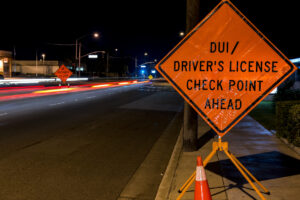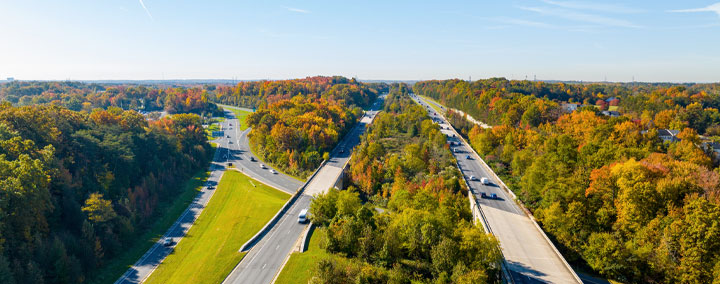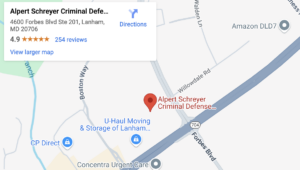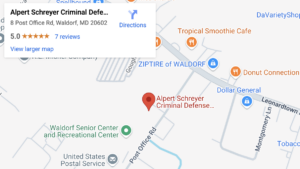DUI Defense Lawyers in Maryland

According to the Centers for Disease Control and Prevention (CDC), DWI checkpoints reduce fatalities, injuries, and property damage, and even accidents caused by drivers under the influence of alcohol by about 20 percent. The intent of these checkpoints is to both deter and identify impaired driving. Although prevention may inspire these safety checkpoints, your encounter with one may lead to a false arrest. An experienced Maryland DUI lawyer can help determine if law enforcement violated your rights. Contact our team at Alpert Schreyer Criminal Defense Attorneys, today at (301) 262-7005 for a free case evaluation.
DWI Checkpoints

Police officers conducting traffic stops are required to have probable cause except in DWI checkpoints situations. These are legal in Maryland as long as law enforcement follows certain requirements. Police must conduct DWI checkpoints at random and temporary locations with no ties to any specific or individual suspicions.
They attempt to identify impaired drivers that might go undetected otherwise. Circumstances and procedures you may encounter at a checkpoint are:
- Avoiding checkpoints – You are allowed to avoid driving through a checkpoint in any lawful manner, such as using appropriate turn signals or making legal U-turns, and maintaining other traffic laws and speed limits. You must do this before you enter the actual checkpoint.
- DWI checkpoint stop – Police will briefly detain you while they interview you, then they may conduct a sobriety test if any suspicion arises.
- Sobriety tests – You may refuse a portable breath test at the checkpoint, but if you are in fact arrested, police may require a chemical test at the police station.
- Charges – In addition to a DWI charge, you may face criminal charges and citations for drug possession, out-of-date insurance, expired driver’s license, defective tail lights, etc.
If police stop you at a DWI checkpoint, questions about your identity, such as your name or address, are the only relevant answers they can require you to give. Police will probably ask you to show your driver’s license and proof of insurance.
You are not obligated to answer questions regarding your activities, past or future—and refrain from answering such questions. Police can use any information you provide against you in the event they arrest you. Contacting an experienced Maryland DUI defense attorney can help you understand your rights should you encounter any problems at one of these DWI checkpoints.
Law Enforcement Guidelines
With the exception of probable cause for a traffic stop applying to DWI checkpoints, all other rules concerning searches and arrests apply. Law enforcement must still obtain a warrant to search a vehicle, provided no other exception applies, and law enforcement must still have probable cause to arrest an individual. It is easy to feel intimidated by uniforms and roadblocks, but don’t let this result in a waiver of consent that could prove detrimental to your case.
Maryland may have a compelling interest in public safety by allowing these DWI checkpoints, but they are only legal if law enforcement complies with the following requirements:
- The stop must be brief, and it cannot include a search of the vehicle or its occupants.
- Law enforcement must provide notice to the public in advance of the checkpoint set-up, including media advertisements such as radio and newspaper announcements and posted signs.
- Police administration must make the location and scheduling decision ahead of time. Individual police officers cannot make the decision to set up a roadblock.
- Police must base checkpoint criteria on an objective standard and not specific or individual suspicions.
DWI checkpoints slow drivers down and in turn allow police officers to interact with drivers while checking for signs of impairment. They often occur on high-traffic weekends, holidays, and are also common in the summertime. One way to learn about upcoming DWI checkpoints is to look for local notifications. State police also publish news releases on Maryland’s website. Keeping these guidelines in mind may help you understand what is required of you and help you to recognize when law enforcement deviates from checkpoint criteria.
If you think that police violated your rights, do not hesitate to call one of our skilled DUI attorneys to go over your case and discuss the circumstances of your stop.
DWI Checkpoint Arrest
If police arrest you at the DWI checkpoint location, an attorney can discuss the circumstances of your arrest. Law enforcement conduct is important when evaluating whether police violated your rights.
- Did law enforcement properly choose a lawful DWI checkpoint location?
- Did police properly adhere to DWI arrest protocol?
- Was the public properly notified about the checkpoint?
- Did law enforcement properly administer sobriety tests?
- Did the Breathalyzer devices function correctly?
Pay attention to how law enforcement conducts your stop and interacts with those ahead of you at the checkpoint. Take note of these circumstances and refrain from consenting to searches or answer questions outside of the guidelines listed above. Should police catch you off guard and arrest you, the DWI attorneys at Alpert Schreyer Criminal Defense Attorneys may help.
Contact a Maryland DWI Defense Attorney to Discuss Your Options
DWI charges on your record range from misdemeanors to felony offenses. The range of penalties you may face for driving impaired could include revocation of your driver’s license, monetary fines, and even jail time. The long-term consequences can include the career-ending loss of professional licenses and security clearances. Don’t take your chances and try to fight these charges on your own—the stakes are too high.




